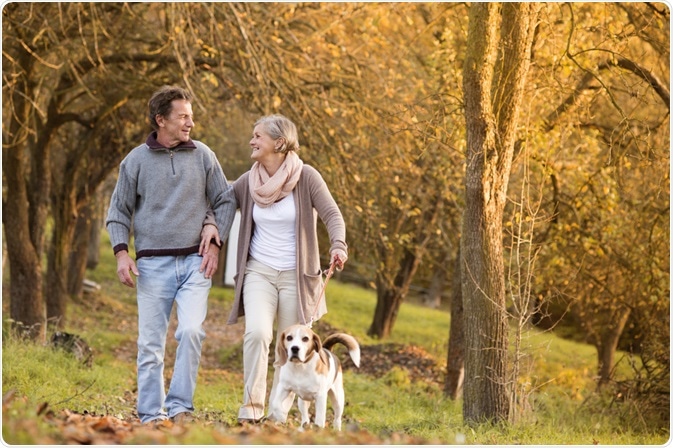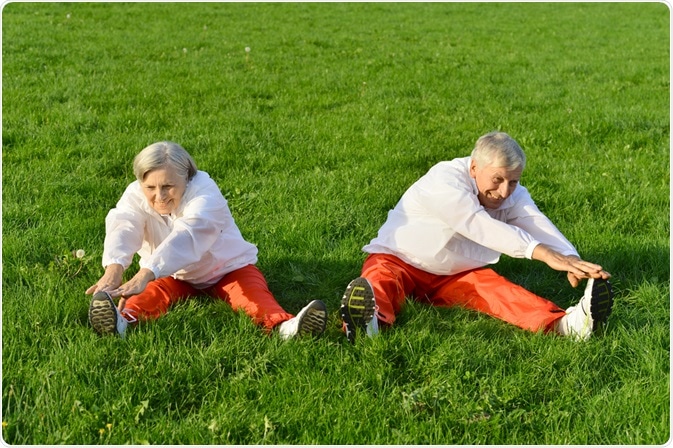Research has shown that pet ownership offers a lot of health benefits to older adults. The bond between pets and their owners can help lower stress and provide happiness to the owners, while also helping increase their fitness levels.

Image Credit: Halfpoint/Shutterstock.com
The health benefits of owning a pet include decreased cholesterol and triglyceride levels, decreased blood pressure, constant companionship, and more opportunities for socialization.
One study that explored the link between bonding / walking with a dog and health status of older adults found that walking a dog was associated with lower BMI, fewer visits to the doctor, and significantly increased activity levels.
People who bond well with their dogs were more likely to take their dogs on longer walks regularly, which improves the overall emotional and physical health of both the owners, and the dogs.
Older adults who own a dog also enjoy several social benefits by just walking with their dog a few times a week. Owners who walk their dogs are seen as approachable and friendly by other people, which helps them make friends easily.
Apart from improved cardiovascular health, stronger muscles, and bones they also experienced lower levels of stress compared to those who did not own a pet.
Regular walks are vital for humans as well as animals, to fight obesity, which is very crucial because obesity can lead to conditions such as osteoarthritis, liver disease, cardiovascular disease, and insulin resistance.
Risks associated with dog walking
Despite the numerous health benefits of dog walking, studies note that walking dogs can be rough and increases the risk of bone fractures in older adults. The number of older people needing medical treatment for injuries associated with walking dogs has increased significantly from 1,700 in 2014 to 4,400 in 2017.
As per a study published in JAMA Surgery, out of 1033 dog walking-related fracture cases that occurred between 2004 and 2017 in patients 65 years or older, women suffered the most fracture cases at 78%, which shows that older women should be made more aware of the risk of walking dogs.
Hip fractures were the most common injury, with the upper extremities such as the wrist, upper arm, finger, and shoulder being the most frequently injured areas. Out of all patients, 28.7% required hospital treatment. Hip fractures in patients over 65 led to sudden and significant changes in lifestyle, such as decreased activity levels and mobility.
While noting that fractures were associated with decreased quality of life and higher mortality rates in older adults, the researchers suggested that older dog owners consider providing obedience training to their dogs so they walk nicely on a leash and do not pull or lunge during walks leading to slip or fall and related injuries. They also recommend smaller breeds for older adults because smaller dogs are easier to manage.
The study did not want to deter older people from walking dogs. Instead, it aimed to draw attention to an activity that can result in significant injury and make older adults more aware of the risks so they can take necessary precautions.
Tips to avoid injury and exhaustion
Older adults who follow a sedentary lifestyle can benefit from owning a dog that gives them a reason to walk regularly, provided they do some research, and get a dog that’s appropriate for their health status and lifestyle.
Before walking your dog, prepare for the walk by stretching the legs, back, and arms; using the right kind of dog leash; and wearing good walking shoes.
Choose the right time of the day for your walk – mornings or evenings during summer and noons during winter. In summers, use sunscreen, loose clothing, and sunglasses and always drink lots of water before and after your walk.
Plan for a 20 to 30 minute walk every day but avoid walking on very hot days and take a water bottle with you.

Image Credit: Ruslan Huzau/Shutterstock.com
Sources
Last Updated: May 21, 2020